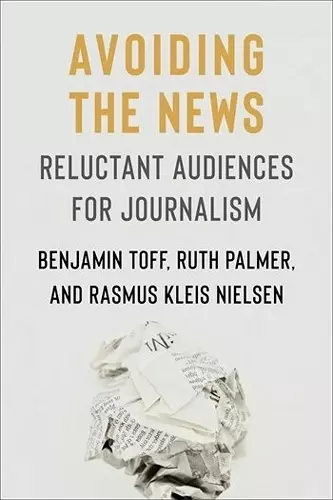Avoiding the News
Reluctant Audiences for Journalism
Ruth Palmer author Rasmus Kleis Nielsen author Benjamin Toff author
Format:Paperback
Publisher:Columbia University Press
Published:23rd Jan '24
Should be back in stock very soon

This insightful book investigates the reasons behind the growing trend of news avoidance, revealing its implications for society and journalism.
In Avoiding the News, the authors delve into the phenomenon of news avoidance, exploring the reasons behind the growing trend of individuals opting out of traditional news consumption. Despite the unparalleled access to information, many people find themselves disengaged from news due to various factors such as time constraints, perceived irrelevance, emotional fatigue, and a lack of trust in media outlets. This book seeks to understand the demographics and motivations of those who choose to circumvent news, shedding light on the implications for both individuals and society at large.
The authors draw upon a rich tapestry of interviews conducted in Spain, the United Kingdom, and the United States, alongside extensive survey data, to paint a comprehensive picture of how individuals construct their understanding of news. The examination reveals that news avoidance is not solely about content; it intertwines with personal identity, ideological beliefs, and the infrastructures that shape our media landscape. The findings suggest that marginalized groups are more likely to avoid news, raising concerns about the potential for increased inequality in media representation and access.
Ultimately, Avoiding the News argues that addressing this issue requires more than just altering news coverage. It emphasizes the importance of cultivating a deeper, empathetic understanding of how different audiences relate to news. By recognizing the complex interplay of social, political, and technological factors that influence news consumption, the authors provide valuable insights into fostering a more inclusive media environment.
This is urgent, necessary reading for anyone in the business of news, for anyone who cares about the news, and for anyone who wants to ensure a future of fair access to knowledge and information for all. We ignore this meticulously researched and empathetically reported book at our own peril. -- Melissa Bell, publisher of Vox Media
News avoiders are one of the most neglected topics in communications research, yet listening to and understanding them may be absolutely crucial for the health of democratic culture. This precisely grounded, sociologically rigorous, and searching three-country study sets completely new standards for pursuing this elusive topic. -- Nick Couldry, London School of Economics and Political Science
This is a beautifully written book that teaches us so much about the nature of our relationships to news by looking in closely at the lives and understandings of people who choose to avoid it. -- Katherine Cramer, University of Wisconsin-Madison
This book is a wide-ranging investigation of not only the quantitative data about news avoidance but also, most importantly, the sentiments of those who have opted out of quality journalism. If journalists want to regain these readers, then it is crucial that we understand them first. This book serves as an important first step. -- Clara Jiménez Cruz, CEO of Maldita.es and chair of the European Fact-Checking Standards Network
A deep dive into the complicated reasons that people distrust the news. A must-read for any journalist who wants to serve the people, meaning all the people—not just their friends and colleagues. -- Amanda Ripley, Washington Post columnist
Highly recommended. * Choice Reviews *
The novelty of this book lies in its exploration of consistent news avoidance and its implications for democracy, as well as its methodological contribution to the field of media studies. It offers an in-depth explanation of the phenomenon of news avoidance. * Journal of Communication Inquiry *
This book takes a key step toward trying to understand audiences who, quite simply, do not see journalistic work as essential. * News Research Journal *
This is a clearly written and thought-provoking book which will prove accessible for journalists as well as scholars. * Journalism *
Makes an important contribution to journalism studies by expanding the discussion on news consumption beyond traditional areas like trust in news and media literacy. * Mass Communication and Society *
The book is a good read and makes a wholesome contribution to the literature. * H-JHistory *
- Winner of Choice Outstanding Academic Title 2024
ISBN: 9780231205191
Dimensions: unknown
Weight: unknown
288 pages